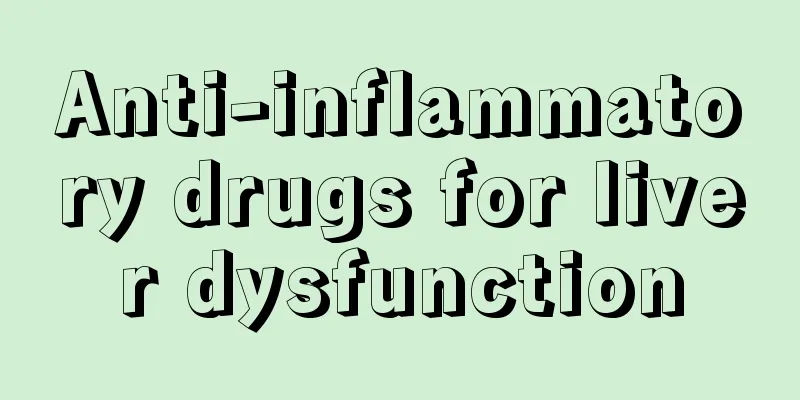Anti-inflammatory drugs for liver dysfunction

|
The liver is an extremely important organ for people, because the liver's main ability is to remove toxins from the body, keep the body clean, and protect the body from various bacteria and viruses. If the liver is overloaded, it will cause great harm to the body. For example, liver dysfunction is a common problem. Let's take a look at what anti-inflammatory drugs are there for treating liver dysfunction? However, since the liver has enormous storage and regeneration capabilities, relatively mild damage will generally not cause obvious functional abnormalities through the liver's compensatory function. If the damage is severe and extensive (one-time or long-term repeated damage), it causes obvious abnormal changes in liver function such as metabolic disorders, reduced detoxification function, bile formation and excretion disorders, and bleeding tendency, which is called liver insufficiency. If liver dysfunction occurs, it is important not to use antibiotics that may cause certain damage to the liver and kidneys. You can choose to use some penicillin or cephalosporin antibiotics for treatment. This will cause little damage to liver function. At the same time, you also need to test your liver function regularly and maintain good living and eating habits to help restore liver function. 1) Drugs are mainly cleared through the liver: including macrolide drugs (excluding erythromycin esters), lincomycin, clindamycin, midecamycin, roxithromycin and azithromycin, which are mainly excreted through bile. A considerable amount of drugs with high concentrations in bile may be metabolized and inactivated in the liver, and a small amount is excreted in the urine. When liver function is impaired, drug excretion is slower, but no obvious liver toxicity occurs. Therefore, it can be used with caution, at the original therapeutic dose or at a reduced dose. Clindamycin and lincomycin are metabolized in the liver and excreted with bile and feces. When liver function is impaired, their elimination half-life is significantly prolonged and blood drug concentrations increase, which can cause an increase in serum transaminase. However, the increase in transaminase and hyperbilirubinemia may be caused by drug interference in colorimetric determination, not hepatotoxic reactions. Therefore, they should be used with caution and the dosage should be reduced. 2) Antibiotics that are mainly or substantially eliminated through the liver: including chloramphenicol, ampicillin esters, erythromycin esters, rifampicin, Isoniazid, amphotericin B, tetracyclines, sulfonamides, ketoconazole, miconazole, etc., when liver function is impaired, the clearance and metabolism of drugs are reduced, which may lead to toxic reactions and should be avoided. |
<<: Can chronic gastritis eat rice noodles
>>: Can people with gastritis eat jujubes?
Recommend
Eye drops preservative ingredients
Some eye drops contain preservatives. The reason ...
The role of nano-anti-hair loss and hair growth
The pace of life is accelerating, and work occupi...
There is a sense of anal pressure when sitting
In the anorectal department of the hospital, some...
Is it necessary to treat liver cancer in the late stage? What is the best treatment for liver cancer in the late stage?
When liver cancer is accompanied by ascites, jaun...
What shouldn’t people with high blood pressure do?
In recent years, with the improvement of living s...
What are the signs before hemorrhage?
Hemorrhage is a very scary symptom. This symptom ...
Is the formation of teratoma related to the radiation used for examination?
The formation of teratoma is usually not directly...
What should I do if a piece of my front tooth falls off
Many people experience partial tooth loss when ea...
What factors are related to the occurrence of pituitary tumors
After the occurrence of pituitary tumors, there a...
Wearing sandals in summer can cause skin cancer. What are the health risks of wearing shoes barefoot?
Ladies who like to wear sandals in summer should ...
What can’t be shared?
Normally when people are at home, many things are...
Is osteosarcoma easy to cure?
Although the incidence of osteosarcoma is not hig...
What targeted drugs should be taken for nasopharyngeal carcinoma
Nasopharyngeal carcinoma is one of the common mal...
Can stomach cancer be detected through physical examination?
Can stomach cancer be detected through physical e...
Who is prone to colon cancer
People who are prone to colon cancer mainly inclu...









